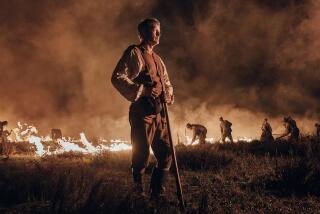Book Review : Travels With an Inveterate Romantic
- Share via
A Poet’s Bazaar. A Journey to Greece, Turkey and Up the Danube by Hans Christian Andersen; translated from Danish by Grace Thornton (Michael Kesend: $21.95; 207 pages)
The ideal travel writer is something quite other than gung-ho. He or she is open, fretful, funny and depressed and ecstatic by turns. It doesn’t hurt if he or she writes well. It doesn’t hurt, in fact, if he is Hans Christian Andersen.
We know Andersen as the author--a century before Maurice Sendak--of the jittery children’s story, all leaps and nerves. But he was a poet, and he wanted desperately to be a playwright; only his plays failed one after the other. His Danish patrons, the king among others, who were proud of him and worried about his morale, gave him stipends to go abroad and cheer up.
The result was a series of travel books: one about Portugal, one about a journey to France, Germany and Italy, and one about a trip to Greece and Turkey. This last, has now been translated and published in an attractively and suitably nervous decorated edition.
An Age of Euphoria
Andersen made his trip in 1840, in a surge of late-Romantic euphoria. Greece, to several generations of European travelers, was Classical Greece--even if the evidence before the eyes presented a country of impoverished Balkan peasants. As for Turkey, it was the mythical, mysterious Orient.
So, in Constantinople--Istanbul, nowadays--Andersen rhapsodizes about slave markets, dervishes, Janissaries, harems and brocaded traders from Smyrna. And even before landing in Greece, he writes about a stretch of barren coastline: “Each plot and parcel has a value, an interest . . . because this was Greece.” In Piraeus, he gives money to the beggars because “After all, they were Greeks.” And riding a carriage up to Athens in clouds of dust, he tells us gamely . . . “But it was classical dust.”
Andersen surges with the best of them. His descriptions of the lit-up sweep of Constantinople’s Golden Horn seen at night, or the misty exit from the Bosphorous into the Black Sea, are lofty but lovely.
But his leaks and trickles are better than his floods. It is not the unfettered escape into the exotic that most suits him, but the odd angles he takes with what is familiar. The swan in him is best seen at the ugly-duckling stage, wondering if he will ever fly.
He starts his trip in Hamburg where he goes to hear Liszt. He does a Liszt rhapsody . . . “Avalanches rolled from the Alps, Italy danced in carnival dress . . . Vesuvius and Etna erupted . . . “ but his eye is irresistibly drawn to the Hamburg merchants crowded in the audience. It could be the expensive Broadway audience of today: “A smile played around their lips as though they had all bought shares and made a fortune.”
A Wistful Description
As for Liszt, the artist-celebrity who traveled Europe amid unstinting adoration and handsome fees, Andersen writes wistfully about the man “who can so journey all his life, always seeing people in their spiritual Sunday best.”
Going through Germany, he takes his first train ride and he is in raptures. Hurtling along from Magdeburg to Leipzig at 20 m.p.h., he marvels at how near things race by, and distant things stand still. As they go through a village, the inveterate duckling-swan reflects that “This is how towns must appear to birds of passage in flight.”
Later, his conviction that the machine-age is “magic” leads him to admire the smoke from the funnel of his Black Sea steamer. “Genius no longer belongs to the individual, it belongs to the whole world,” he marvels.
In Florence, it is cold and rainy, and his tooth hurts. “A solid, plain Danish toothache cannot be compared to an Italian one,” he writes. He is miserable, but he pretends that it is not he but his boots that are complaining. “If I were racked with pain, they were packed with rain,” he muses, with an assist from his translator, Grace Thornton. She has clearly been Andersenized, though that first were should be a was.
In Greece, well-introduced, he becomes acquainted with the royal family, newly imported from Germany. King Otto, a well-meaning man, found the job difficult. Brigandage was common, and brigands were pursued and killed without mercy. But when one was taken prisoner and the king ordered an execution, there was an outcry. It was considered cold-blooded.
The Guards Stood By
The brigand himself was outraged. “It is something we are not used to here,” he complained, and fought the executioner for two hours, almost beheading him at one point. The guards stood by and watched sympathetically.
The child lived in Andersen until he was old. Like a child, he infects us with his moods. When he is depressed, as he becomes on the tedious trip up the Danube, we feel the depression. When he is happy, the radiance spreads. He is particularly happy on a clean, well-run ship. It is tempting to say that the Dane in him, fantasy aside, requires it.
He keeps running into a Persian passenger along the way. A great friendliness springs up, though they can communicate only by smiling. Finally, Andersen tries out the first lines of Genesis in Hebrew. To the romantic, foreign is foreign and a place to be the person you think you would like to be.
More to Read
Sign up for The Wild
We’ll help you find the best places to hike, bike and run, as well as the perfect silent spots for meditation and yoga.
You may occasionally receive promotional content from the Los Angeles Times.






